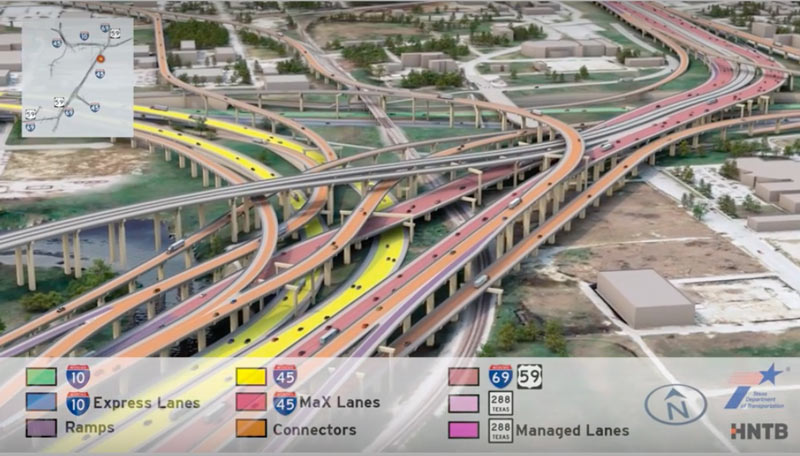I’m not thrilled about this.
Houston will have a say in a regional response to design differences in the planned widening of Interstate 45 within the city — and so will Sugar Land, Montgomery County and Waller County.
After voting last month to establish a working group focused on improving the plans by the Texas Department of Transportation for rebuilding I-45, members of the Houston-Galveston Area Council’s Transportation Policy Council approved the members of the panel Friday over the objections of critics and Harris County officials.
“I do take exception that those who are going to be most impacted are not as represented,” Harris County Precinct 2 Commissioner Adrian Garcia said.
[…]
Houston, via a letter from Mayor Sylvester Turner to TxDOT officials, has sought changes to the project north of downtown to ease those effects. City officials want frontage roads in some areas eliminated or reduced to two lanes, and a greater reliance on transit instead of carpools by making the center lanes bus-only rather than HOV. TxDOT has said it is studying the proposal, but said that after years of discussion it is committed to moving its designs along to keep construction on track while addressing possible changes later.
Regional officials with the transportation council ultimately will decide whether $100 million or more of locally-controlled federal money is spent on the project as phases begin over the next five years, a sum that while small in comparison of the $7 billion-plus cost, significantly affects TxDOT’s ability to leverage state-controlled dollars. That leaves the council to support or not support the changes as a condition of its funding, or allow TxDOT to move forward with its own plans.
The 16-person working group approved Friday includes some Houston-centric officials — including At-Large Councilman David Robinson, Metropolitan Transit Authority Chairwoman Carrin Patman and Port Houston Executive Director Roger Guenther. Half of the members, however, hail from outside Harris County, including Sugar Land Mayor Joe Zimmerman, Waller County Commissioner Justin Beckendorff and Montgomery County Judge Mark Keough.
Galveston County Commissioner Ken Clark, chairman of the transportation council, said his aim in appointing people to the group was to reflect the entire region’s interest in the project.
“Their commuters are driving their freeway roads all over the place,” Clark said. “I thought it was important we had a group that had that … a critical working group if you will.”
Zimmerman, who last month argued Houston-area officials needed to put the project “in a positive light” noted that the regional body’s role was to reflect the entire eight-county area.
“The intent was to keep politics out of this,” Zimmerman said.
Critics, who have said for two years that their concerns have been heard by TxDOT with little progress toward resolving the issues, said a regional group that includes no members from the project area speaking directly for residents and neighborhoods indicates their concerns are being ignored.
“This proposal is inequitable and unacceptable,” said Jonathan Brooks, director of policy and planning for LINK Houston, a local advocacy group that has organized some of the opposition to the project.
First of all, you can never “keep the politics out” of an inherently political process. I cringe at this because the implication here, one that is widely made and shared, is that by keeping “politics” out of this process you are somehow keeping it “clean” and “fair”, because “politics” is dirty and tainted. But “politics”, as a process, is all about engaging communities and getting consensus. You can’t do that if key communities are being excluded while others that have a lesser stake in the outcome are given power over the process. The people whose homes, neighborhoods, jobs, and lives are going to be directly affected by the I-45 project need to have a seat at that table. It’s just wrong that they don’t.
Second, maybe the reason Houston-area officials haven’t been putting such a “positive light” on this project is because we don’t see it as being all that positive. Certainly, plenty of people who live in Houston don’t see it that way. Maybe the problem isn’t branding but the product itself.
And look, none of this would be a problem now if the people who will be the most affected by this project had truly been heard along the way. They’ve been airing the same complaints about the I-45 rebuild because so many of their key concerns are still there. You may say there’s no way to do this project without setting aside most of those concerns. We would say that’s exactly the problem, and should call into question the fundamental assumptions about this project in the first place. If you can’t do it without causing significant harm, maybe you shouldn’t be doing it.

